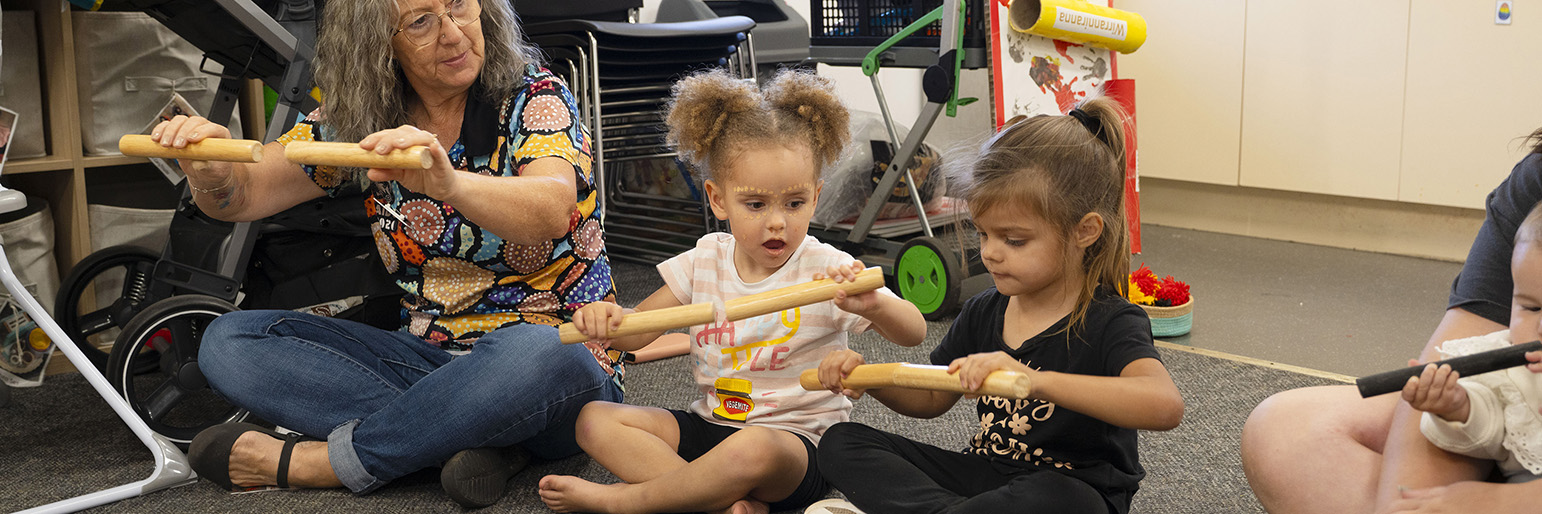Group time songs
Singing together
Singing helps children learn language through rhythm and rhyme. It also provides an opportunity for dance and rhythmic movement as a form of active play.
Suggested group time format:
- Hello song
- Familiar songs
- Movement songs
- Quiet songs
- Goodbye song

Activity
Parents/carers and children sing action songs, counting and nursery rhymes together on the group time mat.
What you'll need
- Voice
- Music playing device (eg CD/MP3 player, phone, Bluetooth speaker etc.)
- Various recorded music
- Song lyrics to share with families
- Song props
- Large piece of material
- Bag, basket or box to keep song props in
- Instruments
- Scarves
- Large mat or group time space
Words to use
- High/low, up/down, open/shut, roll, jig, around, sway, wave, rock, twinkle, shake, to-and-fro
- Sing, words, lyrics, voice, beat, rhythm and rhyme, clap, music
- Body parts, heads, shoulders, knees and toes
- Classical, opera
- Instruments, guitar, microphone, piano, recorder
Learning through play
Ways to develop numeracy through play
- Children will learn to follow patterns and rules while singing.
- Through their lyrics, songs can help children to learn numeracy concepts, such as numbers, positions, direction, speed, shape and size.
- Some numeracy songs include:
- Five Little Ducks
- Three Little Speckled Frogs
- Five Cheeky Monkeys
- Beehive Song
- Baa, Baa Black Sheep
- Five Fat Sausages
- 10 in the Bed
- Once I Caught a Fish Alive
- Three Jelly Fish
- Put a Spot Over Here
- I Can Run as Fast as You
- We’re Going on a Bear Hunt
- Play instruments or sing songs fast and slow.
- Use instruments, voice or body to go high and low.
TIP: use finger-puppets or soft toys to correspond to numbers as you sing songs.
Ways to develop literacy through play
- Music and singing are fun ways to learn new sounds, words and intonations as they’re repetitive and use a similar pattern to speech.
- Music helps develop children’s listening and self-regulation skills.
- Singing teaches children new words and allows them to practice over and over again.
- Some favourite group time songs include:
- Der Glumph
- I Went to Visit a Farm One Day
- Incy, Wincy Spider
- Little Peter Rabbit
- This Little Piggy
- Two Little Dickie Birds
- Hickory, Dickory Dock
- Miss Polly Had a Dolly
- Open Shut Them
- Twinkle, Twinkle Little Star
- If You’re Happy and You Know It
- Dingle, Dangle Scarecrow
- Heads and Shoulders
- Row, Row, Row Your Boat
- Wheels on the Bus
- Rock-a-Bye Your Bear
- Round the Garden.
Extensions and variations to this activity
- Use bought or homemade musical instruments with songs such as:
- Jingle Bells
- We Play and We Play and We Play and We Stop!
- This is the Way We
- I am a Fine Musician
- Everybody Shaking.
- Wave scarves or ribbons while singing.
- Use a song bag with song prompts such a toy frog for Der Glumph, a duck for Five Little Ducks, a monkey for Five Cheeky Monkeys, etc. This can be used to choose the songs for group time. If you have a small group, you can let each child choose a toy from the bag/basket and then take turn singing each child’s chosen song. If you have a large group, just chose a few toys for the bag and pull them out one by one to indicate the next song. You may like to give the children some clues, like the sound of the animal or what they look like and ask them to guess the animal or song by way of introduction (see the songs and singing page in the resources section for more information).
- Make homemade instruments to use at group time.
- Make crepe paper pom-poms to shake while singing and dancing.
- Ask children to help enact songs such as Three Little Speckled Frogs. They may like to wear a mask, hold a toy frog or hold a finger puppet.
- Children may also want to get up and dance during group time songs, this could be encouraged as a form of active play.
Supporting parent engagement in play
Play prompts:
- Name body parts and touch each part as you say the word.
- Ask questions, like: What shall we sing today?
Parents or carers can:
- Sing in their home language.
- Use literacy and numeracy words (see words to use section above).
- Sit with their child at group time.
- Model actions for their children during movement activities.
- Help their children to do the actions in songs by putting their hands over their child’s hands.
- Participate with their child in songs such as Row, Row, Row Your Boat or This Little Piggy.
- Have fun and take joy in their child’s enjoyment.
You can help families by:
- Modelling what you want them to do.
- Talking to them about the focus of the activity and what children might be learning.
- Writing up song lyrics or giving parents/carers a song book so that they can learn the songs.
- Make suggestions on what families can do at home.
- Asking parents/carers to share songs from other cultures.
- Asking parents/carers to sit closely with their child and join in the singing.
Related Great Start activities
Great Start activities are for parents and carers to do with their children.


